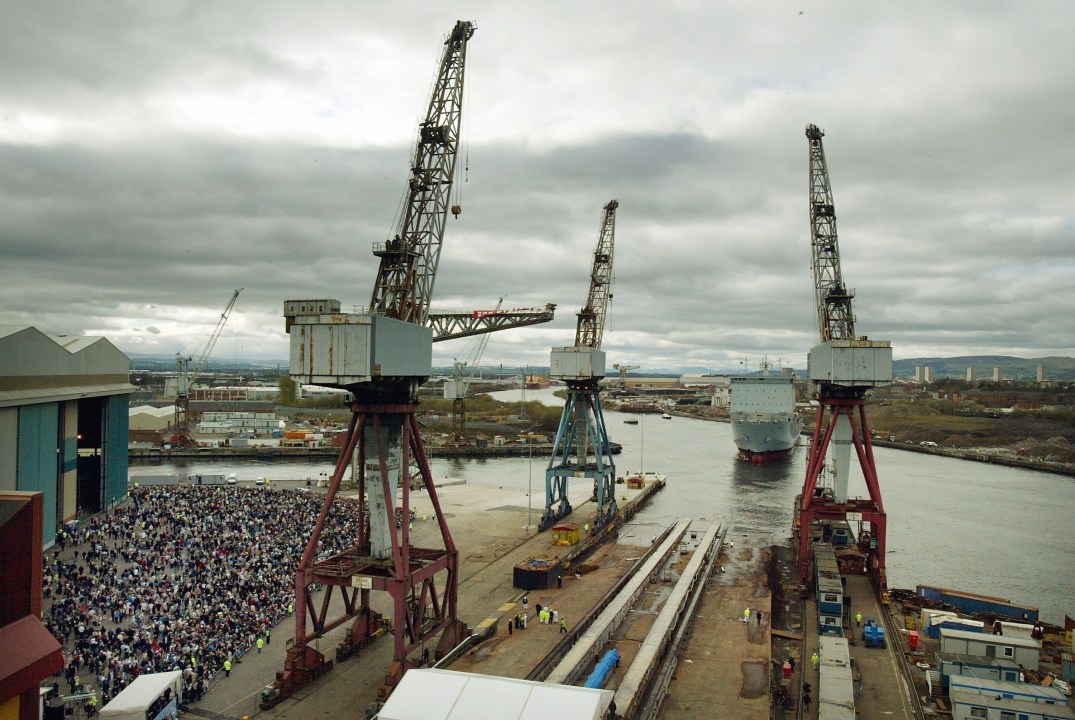The sorry truth of the matter is that Glasgow has been in decline for a century. 1913 was the city’s greatest year. Then it produced a third of the railway locomotives and a fifth of the steel manufactured anywhere in Britain. Most of all, it built ships. Big ships and many of them.
A ship was launched, on average, every day that year. In 1913, 23% of the entire world’s production of ships (by tonnage) was built and launched on the river Clyde. It was an astonishing achievement and the high-water mark of Scottish industrial prowess.
Ship-building, more than any other industry, became part of Glasgow’s essence. The locomotives and the steel and the cars and the sewing machines might all disappear but so long as ships were still built on the Clyde something would remain. There would still be some psychic connection to the days when ‘Clyde-built’ was a stamp of authority and excellence recognised the world over. Glasgow without ships would be a lesser Glasgow, robbed of part of its identity. It is to the city as the frontier is to the United States; a creation myth vital to the city’s sense of itself.
Not just Glasgow, Scotland too. Or, at least, western and central Scotland. The mighty ships were symbols of a Scottish muscularity that expressed itself in steel. There are, and were, many Scotlands but this became, sometimes to the exasperation of Scots elsewhere, the dominant motif.
But even a century ago there were signs, if not of trouble, then of some difficulty. Some ships were being built at a loss. Foreign competition from Germany, Japan and the United States was increasing. Other people could build ships too. Most of all, perhaps, too many yards on the Clyde became dangerously dependent upon a single client: the Royal Navy.
That mattered less when the Royal Navy was still a mighty fleet. It matters rather more now. Any business so dependent upon a single client is a business that can never be truly safe.
It seems as though the government will announce later today that the Clyde yards at Govan and Scotstoun have won a reprieve, though perhaps only a temporary one. BAE Systems will instead end ship-building at Portsmouth, sparing the Glasgow yards the worst of the pain that is an inevitable consequence of having no new work on the order books. (That said: perhaps questions should be directed to BAE management not the politicians. Are BAE capable of running a business that does not depend upon state support?)
This is, quite obviously, a political decision. The Scots must be kept happy or, rather, not be given an excuse to be more unhappy than usual. The politics of next year’s independence referendum plays a part in this but, in truth, the same decision might well have been made even if it were not taken in the shadow of 2014’s plebiscite. Successive Secretaries of State for Scotland have, after all, often threatened to resign over issues such as these. Portsmouth, or any other English region, has never had a man in the cabinet for fights of this kind.
Not that the government should necessarily expect to gain much credit for keeping the Clyde yards open for at least a while yet. The best that may be said is that it will stave off some criticism that it would otherwise have attracted. Neither George Younger nor Malcolm Rifkind won much credit for helping keep the Ravenscraig steelworks alive.
And so you might even argue that the government’s political calculations will backfire. That is, that there will be a sense of resentment in southern England at what may, and not altogether unreasonably, be seen as a spot of Caledonian arm-twisting and blackmail. Besides, how many votes are there for David Cameron to win in Scotland in 2015?
Be that as it may the sorry truth of the matter is that Scotland’s constitutional position has almost no bearing on the future of ship-building on the Clyde. That is to say that unless something changes – though it is hard to see what could – there will be no significant ship-building on the Clyde in 15 years time just as there is no significant ship-building on the once-mighty Wear today. This is not a matter of politics, merely a question of economics.
Both sides will pretend otherwise. Unionists will say only the Union can protect the shipyards; Nationalists will claim the yards would have a healthy future after independence. Both are kidding you.
Unless the Govan and Scotstoun yards diversify they have no obvious long-term future. The Royal Navy is shrinking. And the Royal Navy is their only client. Of course future work for the UK Navy and a fledgling Scottish fleet could be done on the Clyde; there is little reason to suppose the former entity would be interested in shoving work north and still more flimsy grounds for thinking an independent Scotland would provide enough work to keep the yards open. (Unless, I suppose, you asked workers from Keith to Kelso to subsidise Glaswegian shipbuilders.)
Ship-building supremacy long-ago passed to South Korea and Japan. Now China has joined them, forming an all-powerful Asian triumvirate. The last remaining commercial yard on the Clyde, Ferguson’s, is reliant on ferry contracts for its business. But even state-owned Caledonian MacBrayne only places some orders at home. Its other boats are built in Poland or Germany or Spain or France.
Ships built on the Clyde today are no better – though no worse either – than ships built elsewhere. But if you cannot win on quality or on price then your business has a bleak future. And unless that changes there is no reason to think there will be a significant ship-building industry on the Clyde in 15 years time. And it doesn’t matter a damn whether Scotland is independent or not.








Comments